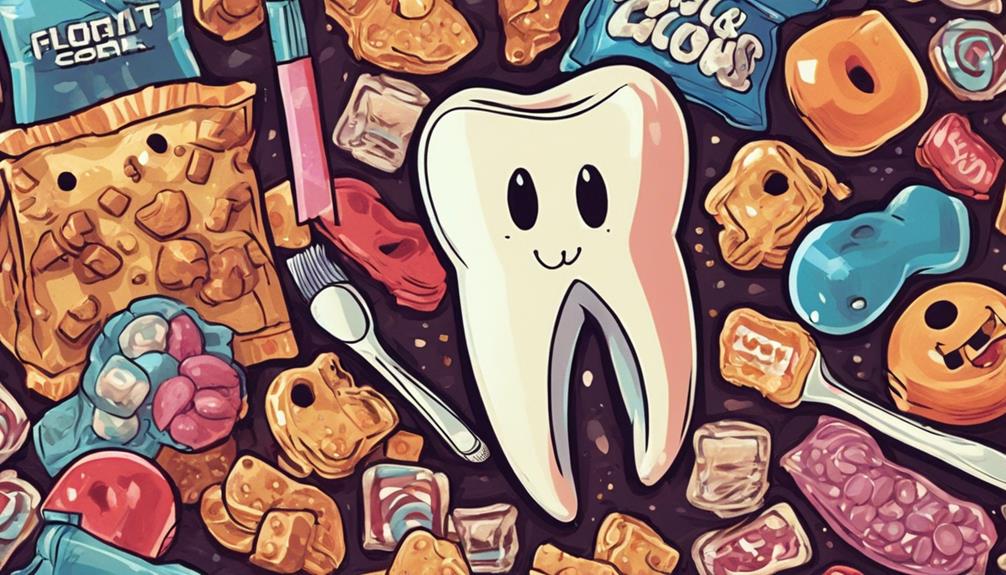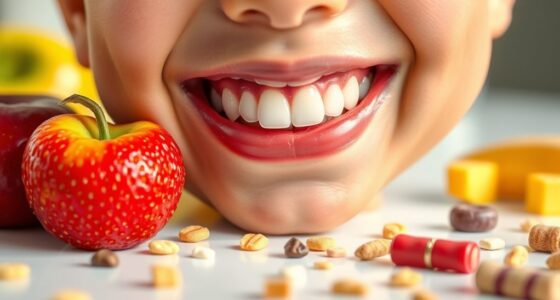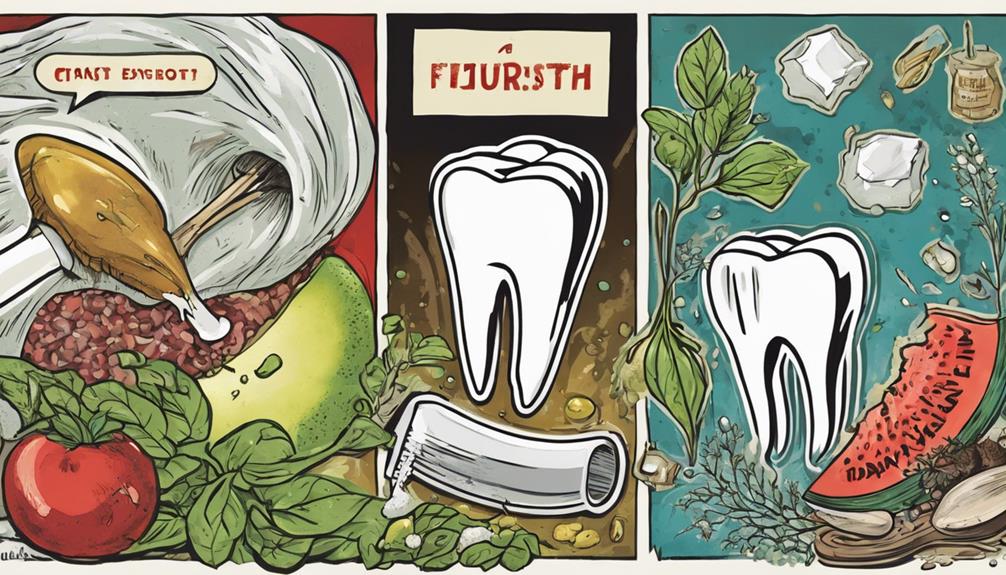You're getting cavities because you're likely overlooking key factors that contribute to tooth decay. Bacteria thrive on the sugars you consume, producing acids that erode your enamel. If you're not brushing and flossing effectively or skipping regular dental check-ups, you're raising your risk. High sugar intake from snacks and drinks exacerbates the problem, while dry mouth can make matters worse by reducing saliva's protective effects. By prioritizing your oral hygiene and being mindful of your diet, you can lower your chances of cavities. Discovering the best practices for your dental health can make a significant difference.
Key Takeaways
- High sugar intake fuels bacteria that produce acids, leading to enamel erosion and increased cavity risk.
- Poor oral hygiene practices allow plaque accumulation, which promotes cavity formation and deeper tooth decay.
- Genetic factors can weaken enamel strength and influence saliva production, increasing susceptibility to cavities.
- Dry mouth reduces saliva's protective effects, accelerating plaque buildup and enamel erosion, heightening cavity risk.
Understanding Cavities

Cavities are fundamentally holes in your teeth caused by the decay that results from bacteria feeding on sugars in your diet. When you consume sugary foods, bacteria in your mouth metabolize these sugars and produce acids. This process leads to the erosion of enamel, the hard outer layer of your teeth. Without proper oral hygiene, these cavities can grow, eventually reaching the softer dentin beneath.
Maintaining good oral hygiene is essential in preventing cavities. Brushing twice a day with fluoride toothpaste and flossing daily can greatly reduce the amount of plaque, which harbors bacteria. If plaque isn't removed, it hardens into tartar, making it even more challenging to eliminate bacteria.
Even with the best practices, some people may still be at risk for cavities due to factors like genetics or dry mouth, which decreases saliva's natural ability to protect your teeth. Regular dental check-ups are vital for early detection, as many cavities can be asymptomatic in their early stages.
Mechanism of Cavities Formation

When bacteria in plaque produce acids, they start the process of eroding your tooth enamel, leading to cavity formation. This erosion occurs as the acids attack the minerals in your enamel, resulting in demineralization. If you don't manage the plaque and tartar buildup, the damage can progress deeper, potentially exposing the sensitive dentin and pulp of your teeth.
Here's a breakdown of how cavities form:
| Stage of Cavity Formation | Description |
|---|---|
| 1. Initial Plaque | Bacteria in your mouth accumulate, forming plaque. |
| 2. Acid Production | Bacteria produce acids from sugars, eroding enamel. |
| 3. Demineralization | Minerals are lost from enamel, leading to soft spots. |
| 4. Cavitation | Enamel breaks down, creating a cavity. |
| 5. Advanced Decay | Without treatment, decay reaches deeper layers, causing pain. |
To prevent tooth decay, it's essential to maintain good oral hygiene by brushing and flossing regularly. Regular dental check-ups can help you manage plaque and tartar buildup effectively, keeping your teeth healthy and cavity-free.
Risk Factors for Cavities

When it comes to cavities, your diet and oral hygiene play vital roles.
High sugar intake and poor brushing habits can put you at greater risk.
Additionally, genetic factors might influence how susceptible you are to tooth decay, making it important to understand your unique situation.
Dietary Sugar Intake
High sugar intake greatly raises your risk of cavities by fueling bacteria in your mouth that produce harmful acids, leading to enamel erosion. Eating sugary foods, like candies and sodas, creates an acidic environment that promotes rapid tooth decay. The more often you indulge in these treats, the more likely you're to develop cavities. Studies show that people with a high-sugar diet are more prone to oral health issues compared to those who limit their sugar intake.
It's not just obvious sweets that can harm your teeth; starchy foods like white bread and crackers also break down into sugars, feeding the cavity-causing bacteria lurking in your mouth. This constant battle against harmful bacteria is why monitoring your dietary sugar is essential for maintaining your oral health.
To help protect your teeth, consider swapping out sugary snacks for healthier options, such as crunchy fruits and vegetables. These alternatives not only provide essential nutrients but also aid in cleaning your teeth naturally. By being mindful of your sugar consumption, you can greatly reduce your risk of developing cavities and promote better oral health for the long term.
Oral Hygiene Practices
Maintaining effective oral hygiene practices is vital for preventing cavities and guaranteeing long-term dental health. You need to focus on proper brushing and flossing techniques to minimize cavity risks. Using a soft-bristled toothbrush and gentle pressure helps protect your enamel and gums. Neglecting to floss daily allows plaque and food particles to build up between your teeth, greatly increasing the chances of caries formation.
Regular dental check-ups are also essential. These visits help catch cavities early, preventing them from worsening into more serious issues. If you have dental restorations like fillings or crowns, make sure you clean around them thoroughly to avoid secondary decay caused by bacteria in neglected areas.
Incorporating antibacterial mouth rinses into your oral care routine can further enhance your efforts. These rinses reduce plaque buildup and harmful bacteria, helping to keep your mouth healthy.
Genetic Predisposition Factors
Genetic predisposition plays an essential role in your risk of developing cavities, influencing factors like enamel strength and the makeup of your oral microbiome. If you come from a family with a history of dental issues, it's important to understand how your genetics might be at play.
Your genetic predisposition can affect saliva production, leading to dry mouth, which heightens your cavity risk. Additionally, certain inherited traits may weaken your enamel or predispose you to bacteria that are particularly harmful.
Moreover, your immune response can be less effective against these harmful bacteria, making it important to adopt proactive dental care strategies. If you have a family history of cavities, regular check-ups and tailored preventive measures can help you fight back against your genetic risks.
Consider these emotional factors that might resonate with you:
- The anxiety of visiting the dentist more frequently due to hereditary issues.
- The frustration of feeling like you're doing everything right, yet still facing cavities.
- The disappointment of seeing family members struggle with dental health.
Dietary Influences on Cavities

Your diet plays an essential role in cavity formation, with sugar and acidic foods being major culprits in enamel erosion. When you consume sugary snacks, you're feeding harmful bacteria in your mouth, which produce acids that attack your enamel. This process greatly increases your risk of developing cavities.
Frequent consumption of acidic foods, like soda and fruit juices, can further exacerbate tooth decay. The acids in these beverages can erode enamel, making your teeth vulnerable to cavities. Even seemingly innocent starchy foods, such as white bread, can contribute to the problem, as they break down into sugar, feeding bacteria.
If you suddenly increase your intake of sugary snacks or beverages, you might notice unexpected cavities appearing. This rapid shift leads to a spike in acid production by oral bacteria, putting your dental health at risk. Additionally, cough drops high in sugar can stick to your teeth and promote decay when used frequently during sickness.
To protect yourself, opt for crunchy fruits and vegetables as snacks. They help clean your teeth and promote saliva production, which can combat cavity formation. Making smarter dietary choices is essential for maintaining your dental health.
Health and Lifestyle Factors

Stress can take a toll on your immune system, leading to unhealthy eating habits that increase your risk of cavities. When you're stressed, you might reach for sugary snacks, which feed the bacteria in your mouth. This, combined with other health and lifestyle factors, can create a perfect storm for dental issues.
Consider these emotional impacts:
- Feeling overwhelmed by stress can lead to poor food choices.
- Struggling with dry mouth from medications reduces saliva, making it hard to wash away bacteria.
- Dealing with gum recession exposes your tooth roots, increasing vulnerability to decay.
Both dry mouth and gum recession greatly contribute to cavity risk. If you're on medications or going through treatments like chemotherapy, be especially mindful of your oral health.
Acknowledging these factors is essential in preventing cavities. Prioritize your overall well-being by managing stress and staying vigilant about your oral care routine. By doing so, you can actively reduce your chances of cavities and maintain a healthier smile.
Oral Hygiene Practices

Maintaining proper oral hygiene practices is vital for countering the effects of lifestyle factors that can lead to cavities. Brushing your teeth twice daily with a soft-bristled toothbrush helps prevent cavities, but make sure you're using the right technique. Avoid brushing too aggressively, as this can wear down enamel and cause gum recession. Don't forget to clean around any dental restorations like fillings and crowns, since plaque can accumulate in those areas.
Flossing at least once a day is essential, too. It removes plaque and food particles that your toothbrush can't reach, greatly reducing your risk of cavities.
Regular dental care is equally important; aim for check-ups every six months. These visits allow your dentist to monitor your oral health, detect early signs of cavities, and remove stubborn plaque and tartar.
Lastly, consider using fluoride toothpaste and mouth rinses. Fluoride strengthens enamel and aids in cavity prevention by promoting the remineralization of early decay spots. By incorporating these oral hygiene practices into your daily routine, you'll be well on your way to maintaining a healthy smile and preventing cavities.
Symptoms and Detection

You might notice increased sensitivity to hot, cold, or sweet foods, which can signal that cavities are forming.
Look for visible changes on your teeth, like holes or dark spots, as these are clear signs of decay.
Recognizing these symptoms early can help you seek the dental care you need to prevent further damage.
Sensitivity to Temperature Changes
Experiencing increased sensitivity to temperature changes in food and drinks often signals the presence of cavities, as exposed dentin allows stimuli to reach nerve endings more easily.
You might feel discomfort or sharp pain when consuming hot, cold, or sweet items, which suggests that decay has progressed beyond the enamel. This sensitivity can escalate from mild discomfort to severe pain, particularly during biting or chewing.
Recognizing the symptoms of sensitivity can help you take action before it worsens. Consider these emotional reactions:
- Frustration at not enjoying your favorite foods.
- Fear of dental procedures looming ahead.
- Discomfort that disrupts your daily life.
Regular dental visits are essential for early detection of cavities. Increased sensitivity is often a key symptom that helps dentists identify existing decay before it escalates.
If you're experiencing this sensitivity, don't ignore it. Schedule a dental appointment to address the issue and protect your oral health. Remember, catching cavities early can save you from more complicated and costly treatments later on.
Visible Structural Changes
Visible structural changes in your teeth, like holes or dark spots, often signal that decay has advanced and needs professional evaluation. These changes indicate that cavities are forming, and ignoring them can lead to more severe dental issues.
You might also notice increased sensitivity to hot, cold, or sweet foods, which suggests that enamel erosion has exposed the softer dentin underneath. This sensitivity is your body's way of telling you that it's time for a dental exam.
If you experience pain while chewing or biting, it's a sign that the cavity has reached deeper layers of your tooth or even affected the pulp. This situation requires immediate dental attention to prevent further complications.
Additionally, if you see swelling or experience pain, it could indicate abscess formation due to decay reaching the tooth root, which necessitates urgent care.
Regular dental check-ups are essential for early detection of cavities and visible structural changes. Many issues may not be noticeable without a professional examination, so don't wait until you see visible signs—schedule that dental exam to keep your teeth healthy!
The Role of Bacteria

Bacteria play an essential role in the development of cavities by producing acids that erode tooth enamel when they metabolize sugars from your diet. The mouth is home to around 300 different bacterial species, and those that thrive in an acidic environment can lead to significant dental issues.
When you consume starchy or sugary foods, these bacteria in dental plaque create an acidic environment that increases your risk of cavities.
Consider the following:
- Harmful bacteria can flourish in your mouth, undermining your dental health.
- One kiss can spread around 80 million bacteria, amplifying the risk of cavities.
- Neglecting oral hygiene allows bacterial biofilm to thrive, making your teeth vulnerable.
Dry Mouth and Its Effects

Dry mouth can greatly compromise your dental health by reducing saliva's protective effects against cavity-causing bacteria. When you experience dry mouth, or xerostomia, your saliva production decreases, making it harder for your body to wash away food particles and neutralize harmful acids produced by bacteria. This creates a perfect environment for cavities to form.
Various factors, like certain medications, medical conditions, or lifestyle choices, can lead to reduced saliva flow. With less saliva, bacteria thrive, leading to faster plaque buildup and accelerated enamel erosion. This increases your risk of tooth decay and oral infections, making it important to pay attention to your oral hydration.
To combat the effects of dry mouth, staying hydrated is essential. Drinking water regularly can help maintain adequate saliva levels. If you're struggling with persistent dry mouth, consider using saliva substitutes to keep your mouth moist. Consulting with dental professionals can also provide you with tailored solutions to manage dry mouth effectively.
Preventive Care Strategies

To keep cavities at bay, you need to prioritize your daily oral hygiene routine.
Brushing twice a day with fluoride toothpaste and flossing can make a big difference.
Also, consider modifying your diet by steering clear of sugary snacks and opting for healthier choices.
Daily Oral Hygiene Importance
Maintaining daily oral hygiene is essential for preventing cavities and ensuring long-term dental health. You need to focus on effective practices that eliminate plaque and reduce your risk of cavities. Start by brushing twice daily with fluoride toothpaste, as it removes plaque and strengthens your enamel. Don't forget to floss daily to reach those tricky spaces between your teeth, where plaque loves to hide.
Here's what you can do to enhance your oral hygiene routine:
- Schedule regular dental check-ups to catch cavities early.
- Use dental sealants for extra protection on vulnerable tooth surfaces.
- Consider xylitol candies, which can help inhibit cavity-causing bacteria.
Dietary Modifications for Prevention
Making smart dietary choices is key to preventing cavities and promoting your overall oral health. Start by reducing your sugar intake, as high sugar consumption feeds harmful bacteria in your mouth. These bacteria produce acid that erodes enamel and increases your risk of cavities.
Also, limit your consumption of starchy foods like white bread and crackers, which can contribute to plaque buildup and acid production.
Incorporate crunchy fruits and vegetables, such as apples and carrots, into your meals. They not only promote saliva production but also help clean your teeth naturally.
Drinking water regularly throughout the day is essential, too. It rinses away food particles and bacteria, supporting your oral hygiene efforts.
Don't forget about the importance of fluoride toothpaste. Regular brushing with fluoride toothpaste strengthens enamel and helps protect against cavity formation.
Frequently Asked Questions
Why Do I Constantly Get Cavities?
You constantly get cavities because your diet likely includes too many sugary foods, your oral hygiene routine might be lacking, or you may not visit the dentist regularly for necessary check-ups to catch issues early. One way to improve the situation is to cut back on sugary snacks and beverages, and make sure to brush and floss your teeth at least twice a day. It’s also important to schedule regular dental check-ups and cleanings to address any potential issues before they become more serious. Preventing childhood cavities is crucial for maintaining good oral health and avoiding the discomfort and potential health complications associated with dental problems.
How Do I Stop Getting Anymore Cavities?
To stop getting cavities, brush twice daily with fluoride toothpaste, floss regularly, limit sugar intake, and visit your dentist twice a year. Stay hydrated and consider using xylitol products to strengthen your enamel.
How Many Cavities Are Too Many?
How many cavities are too many? Well, if you're getting three or more in a year, it's time to take notice. Ideally, you'd aim for one every few years to keep your teeth healthy.
Why Do I Keep Getting a Cavity on the Same Tooth?
You keep getting a cavity on the same tooth because it might be hard to clean, or previous restorations could've worn down. Dietary choices and gum recession may also contribute to the problem.
How Do Sugary Snacks Contribute to Cavities?
Sugary snacks can significantly contribute to cavities due to the dangers of sugar snacks. Bacteria in the mouth feed on sugar, creating acids that attack the teeth. Over time, this can lead to the breakdown of tooth enamel and the development of cavities. Limiting sugary snacks can help prevent dental decay.
How Do Sugary Snacks Contribute to Cavities?
Consuming sugary snacks is the real reason to avoid sugary snacks for the sake of your dental health. When you eat these snacks, the bacteria in your mouth produce acids that can lead to tooth decay and cavities. Limiting your intake of sugary snacks can help maintain a healthier smile.
Is Eating Sugary Snacks the Main Cause of Cavities?
Many dentists agree that the main reason for cavities is consuming sugary snacks. To avoid sugary snacks reason is to prevent tooth decay and maintain good oral hygiene. Opt for healthier options like fruits and vegetables to keep your teeth strong and cavity-free.
Conclusion
In the battle against cavities, knowledge is your strongest weapon. By understanding the sneaky culprits behind tooth decay, you can arm yourself with effective prevention strategies.
Think of your mouth as a fortress—fortify it with a balanced diet, regular dental visits, and good hygiene.
Don't let sugary foes breach your defenses! Take charge of your oral health today, and keep your smile shining like a beacon, free from the shadows of cavities.









